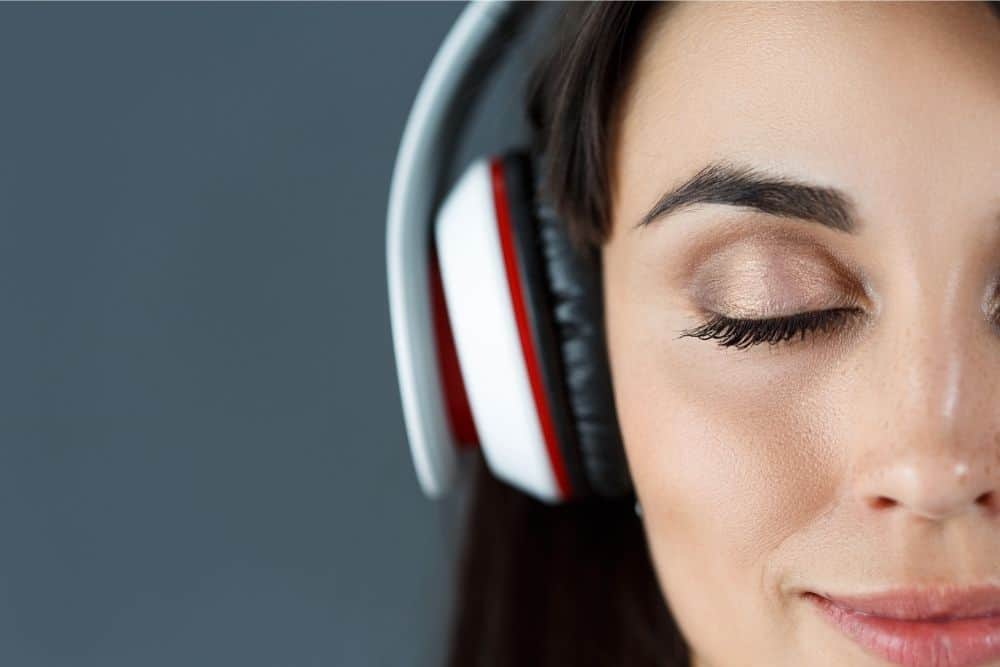For many of us, noise-canceling isn’t just a bonus, it’s a necessity. Once you’ve gotten accustomed to the crisp sound quality and total lack of background noise, it’s hard to imagine giving it up. But the human ear is a complicated, delicate thing, and we all need to do our best to care for our hearing.

Headphones have been linked to hearing loss, and it’s a worldwide problem. Excessively listening to loud music can damage the inner ear, and even lead to permanent damage. When listening with noise-canceling headphones, audio feels closer than ever. So, is noise canceling safe?
Although all headphones can hurt the ears, noise-canceling may actually be better for your hearing than the standard headphone – but only if used correctly. In this guide, we discuss the pros and cons of noise-canceling headphones, and just how safe they are.
Are Noise-Canceling Headphones safe?

Noise-canceling headphones work to block out any ambient background noise, to reduce disturbance and deliver better quality audio. There are two types of noise-canceling: passive noise-canceling (PNC), and active noise-canceling (ANC).
PNC headphones work as a simple barrier, forming a soundproof cup around the ear. These are best for sudden noises, such as those from construction sites. ANC headphones are more complicated, and use opposing frequencies to manipulate and remove the presence of background noise. They need to absorb sound to adjust, so work best for ambient noise, such as cafés and public transport.
If you’re worrying about the health of your ear, you may be curious about the effect this noise cancellation has on your hearing. The good news is, noise-canceling headphones may actually be the best option for ear safety.
Noise-canceling headphones were originally developed to protect the hearing of pilots, and those working noisy jobs. Wearing noise-canceling headphones reduces the impact that the repeated loud noises have on the ear drums, creating a safer working environment.
If you’re wearing noise-canceling headphones to block out the repeated bangs and crashes of a nearby construction site, then they’re helping your ears, rather than hurting them.
But what about if you use noise-canceling headphones for audio? Again, they may actually be beneficial.
All of us have, at one time or another, turned up the volume to block out a noisy environment. Whether it’s a busy café, never ending building work, or simply a chatty neighbor. Turning up the volume helps to refocus, and allow us to hear all the nuances and levels of whatever we might be listening to.
However, by instinctively turning up the volume we could be causing long term harm – and this is where we feel the benefits of noise cancellation.
As noise-canceling headphones already work to block out the background noise, the volume can be kept lower. Rather than playing with the volume controls, a user simply needs to turn on the ANC, and they can continue to listen clearly, at a lower volume.
Of course, this only makes the headphones safer if you are listening at a lower level. If you continue to blast music, then noise-canceling headphones don’t provide any extra protection. However, there’s absolutely no indication that using noise-canceling headphones at the same volume is worse than other forms of headphones.
The only time when noise-canceling headphones are dangerous is if you’re using them out and about. As they limit our perception of the surrounding environment, they can lead to accidents. When in busy areas, avoid using noise-canceling headphones.
Pros of Noise-Canceling Headphones
- The volume can be kept lower
Protecting our hearing is vital for any music lover. To do so, we need to be careful with the use of headphones. That means keeping the volume low.
Often, when the volume goes up, it’s because we’re using music to cover up annoying sounds. Sometimes we can keep on raising the volume without realizing it, desperate to block out the disturbances. Before you know it, the music is blasting, and your eardrums are taking a pounding.
With noise-canceling headphones, the background noise is blocked out already. That means you can sit and enjoy whatever you want to listen to, while protecting your sensitive inner ears.
- Benefits noise related stress
Repeated loud noises get stressful quickly, and this can lead to migraines and even high blood pressure. Anyone who has ever tried to work to a deadline with a background track of construction can attest to just how stressful noise can be. And in today’s environment, it can be hard to find total silence.
With noise-cancelling headphones, you can make any place quiet. By blocking out the incessant noise, it’s easier to relax. This also increases focus, which is why so many office workers prefer to use noise-cancellation.
- Better audio experience
Without the external sounds, you’re free to really experience the audio. Whether you’re watching a film, enjoying your favorite song, or simply trying to take a call. By blocking out the persistent interruption of background disturbances, it’s easier to concentrate on the sounds coming from your headphones.
There is a slight flip side to this. Some audiophiles complain that the background frequency of ANC headphones actually manages to disturb the audio process. While this won’t bother many of us, it may be an issue if you prefer the best sound quality.
- Don’t need to be used with audio
For some of us, total silence is optimal. Even the slightest sounds can throw off concentration, meaning music is not an option. But without music, everyday sounds leak in, and concentration is gone.
Noise-cancelling headphones don’t need audio to block out noise, they do it simply by the design of the headphone. Whether PNC or ANC, they deliver an almost completely silent experience. That means you can focus with no interruptions.
- Can turn noise cancellation off
A surprising benefit of active noise-canceling headphones is that they don’t actually need to be noise-canceling. If you’re sitting in a quiet environment, or even going for a walk, you can turn off the noise cancellation, and let the background in. If you’re feeling unsure over noise cancellation, this is a pretty big benefit. It allows the user to take control of the experience.
Cons of Noise-Canceling headphones
- Potential nausea
Some people have found that using noise-canceling headphones can lead to nausea. While this isn’t a problem for everyone, it is a recognized issue, and one to be aware of. ANC headphones can cause the ear to register a change in barometric pressure, which can cause dizziness, jaw pain, headaches, and pressure on the ear, as well as sickness.
The reason is all to do with frequencies and air pressure. When the pressure outside the ear is different to the pressure inside, it throws off the balance. As ANC headphones use low frequencies to cancel noise, the air can register this as a change in pressure, similar to an airplane descending. This pressure change is what causes the issues with nausea.
Unfortunately, there is no cure for this, but it doesn’t affect everyone. Some people will find they have no issues at all, and others will only feel the effects after extended usage.
- Issues for those with tinnitus
Tinnitus is a very common disorder, in which the ear experiences frequent buzzing or ringing sounds. This is often made worse when there’s a lack of external noise to distract from the ringing. When using noise-canceling headphones without any audio, some who suffer with tinnitus have reported the problem appears to be worse.
However, it’s important to know that the headphones themselves aren’t actually exacerbating the problem. There’s no evidence that links noise-cancelling headphones to increased tinnitus. Instead, the lack of noise simply makes it easier to perceive the effects of tinnitus.
If you regularly suffer from tinnitus, ANC headphones are recommended. As they can be used well at a lower volume, they reduce the chances of causing tinnitus in the first place.
- Removes the environmental noises
If you’ve ever been walking along carefree, only to be shocked by the appearance of a bicycle zooming by, you’ll know how disorientating these sudden surprises can be. And that’s nothing compared to the danger of when a car appears, and you weren’t expecting it.
The point of noise-cancelling headphones is to block out background noise, but this isn’t very useful when you need background noise. When outdoors, we need to be able to hear the noises surrounding us, so we can respond to the environment. Otherwise, we risk putting ourselves in danger. It’s recommended to avoid noise-canceling headphones when navigating outdoors, so you can stay alert, and stay safe.
Headphones should never be worn when driving, and noise-cancelling headphones particularly should be avoided. It isn’t safe for you, or for others on the road.
- Can be disorientating
Our senses all work together to create a rich picture of the world around us. When we lack noise, it’s easy to be taken by surprise. Sound helps us to orientate ourselves within our environment.
When it’s not there, the effect can be odd. Some find that noise-canceling headphones leave them feeling displaced.
Final Thoughts
Noise-canceling headphones are safe to use, so long as you use them sensibly. Never use them when you need to be aware of the environment. When exercising outdoors, it’s important to be alert to those around us. Avoid wearing noise-canceling headphones, and you’ll be keeping you – and anyone passing – safe.
For our hearing, noise-canceling headphones can actually be the better choice. They block out disturbing background noise, and they allow us to listen to audio at a lower volume. If you’ve become attached to your noise-canceling headphones, there’s no need to let them go. Just be sure to keep the volume down to protect your ears.
